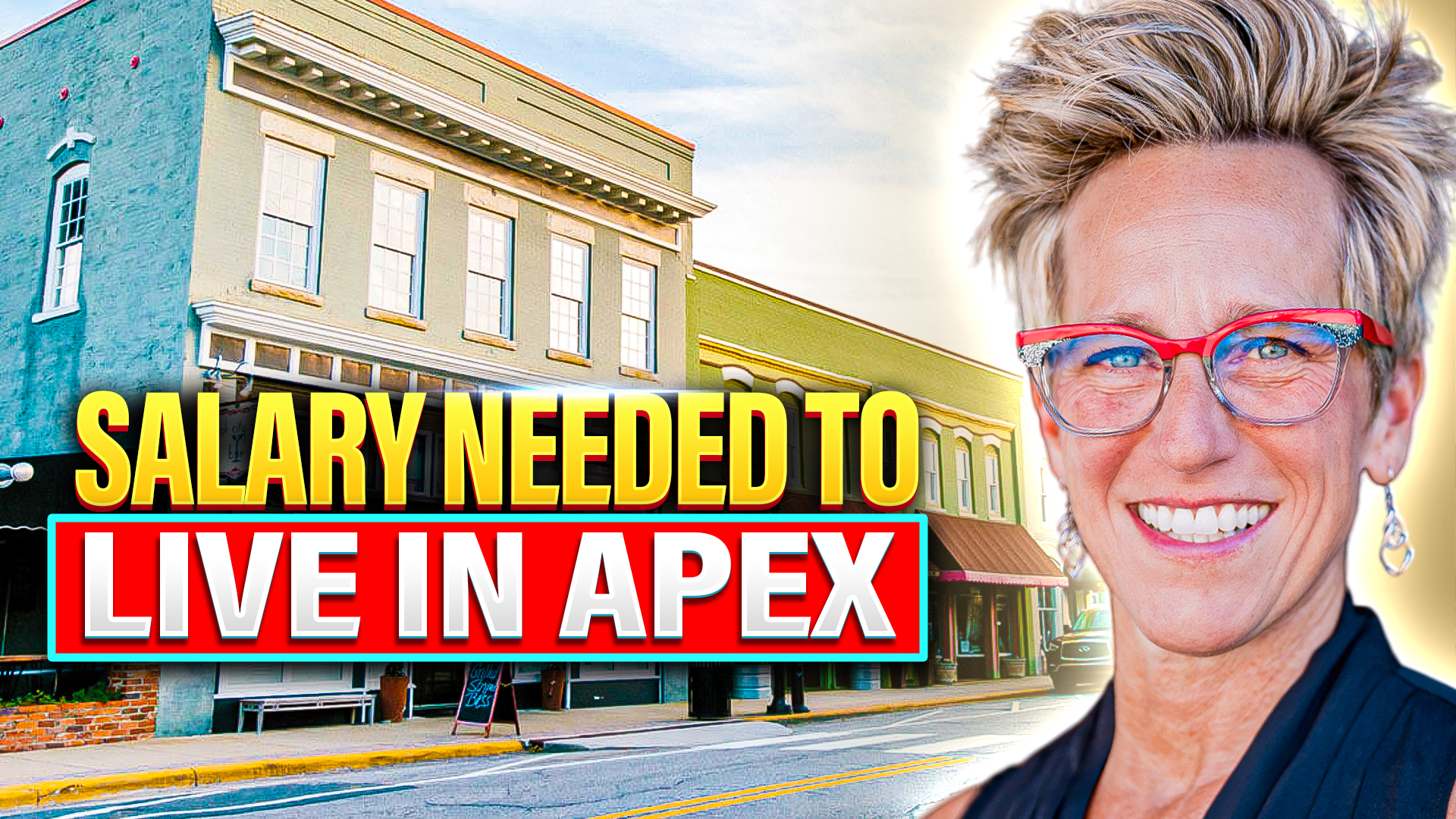What Salary Do You Need to Live in Apex NC?
Buying a home is a big financial decision, and understanding what affects affordability is essential for making informed choices. Several factors, from interest rates to property taxes, affect how much home you can afford. In this post, we’ll explore five key factors that directly impact home affordability and look at real-life scenarios to determine how much salary you need to own a home in Apex, North Carolina.
5 Key Factors That Impact Home Affordability
- Interest Rates
Interest rates are among the most significant factors influencing your monthly mortgage payment. Even a small change in interest rates can significantly affect how much you can afford. For example, a 1% increase in the interest rate reduces your buying power, meaning you can afford less home for the same monthly payment. Securing a favorable interest rate is crucial, as lower rates result in lower monthly payments, freeing up more of your budget for other expenses.
- Down Payment
Your down payment directly impacts the size of your mortgage. The more you can put down upfront, the less you’ll need to borrow, which translates to smaller monthly payments. For example, if you can put down 20%, you’ll avoid paying Private Mortgage Insurance (PMI), a cost required for down payments of less than 20%. This can save you hundreds of dollars each month and make your home purchase more affordable. However, even with a smaller down payment, you can still manage your monthly payments by balancing other factors, such as your interest rate.
- Current Debts
Lenders closely evaluate your debt-to-income (DTI) ratio when determining how much they will lend you. If you have significant existing debts, such as student loans, car payments, or credit card debt, it may limit the loan amount you qualify for, making it harder to afford a more expensive home. Paying down debts can improve your DTI ratio, increasing your chances of qualifying for a better loan. Evaluating and reducing your debts before applying for a mortgage can significantly impact home affordability.
- Credit Score
Your credit score significantly determines your mortgage interest rate and, ultimately, your affordability. A higher credit score can help you secure a lower interest rate, saving you money on monthly payments.
Conversely, a lower credit score might result in higher rates and fewer loan options. If your credit score needs improvement, it’s a good idea to work with a lender to develop a plan for boosting your score before applying for a mortgage. Actions like paying bills on time, reducing credit card balances, and avoiding new debt can help improve your credit score.
- Property Taxes and Insurance
Property taxes and homeowners insurance are essential parts of homeownership that can’t be overlooked. These costs vary depending on where you live and directly impact your monthly budget. Your monthly housing expenses will rise in areas with higher property taxes, even if your mortgage payments are relatively low. Understanding the local tax rates and insurance costs is critical to accurately estimating your total cost of living.
Real-Life Example: How Much Salary Do You Need to Live in Apex, NC
Let’s take a closer look at home affordability in Apex, North Carolina, where the median price for a single-family resale home is around $660,000. Here are two different scenarios based on your down payment:
Scenario 1: You put down 5%, or $33,000, which leaves you with a loan amount of $627,000. At an interest rate of 6%, your monthly principal and interest (P&I) payments would be $3,760. Add property taxes of around $450 and homeowners insurance of about $150 per month. With less than 20% down, you’ll also need to pay PMI, which would cost an additional $250. This brings your total monthly payment (PITI) to approximately $4,610. To afford this home, you’d need a gross monthly income of $15,367 or an annual income of $184,400.
Scenario 2: You put down 20%, or $132,000, reducing your loan amount to $528,000. With no PMI and the same 6% interest rate, your monthly P&I payment would be $3,165. Add $450 in property taxes and $150 in homeowners insurance, bringing your total PITI payment to $3,765. To afford this home, you’d need a gross monthly income of $12,550 or an annual income of $150,600.
Conclusion
Understanding the factors that impact home affordability—such as interest rates, down payments, current debts, credit score, and property taxes—is crucial when budgeting for a home purchase. In places like Apex, NC, where home prices can be higher than average, knowing how much income you need to afford a home comfortably is essential.
By keeping your housing expenses within 30% of your gross monthly income, you’ll be better positioned to achieve financial stability while enjoying the home that fits your needs and budget.
Thinking of a move to the Raleigh, NC area? ☎ 919-274-2499 📧 [email protected]
Schedule a FREE consultation with Heather Taylor 👉 https://bit.ly/TayloredZoom

